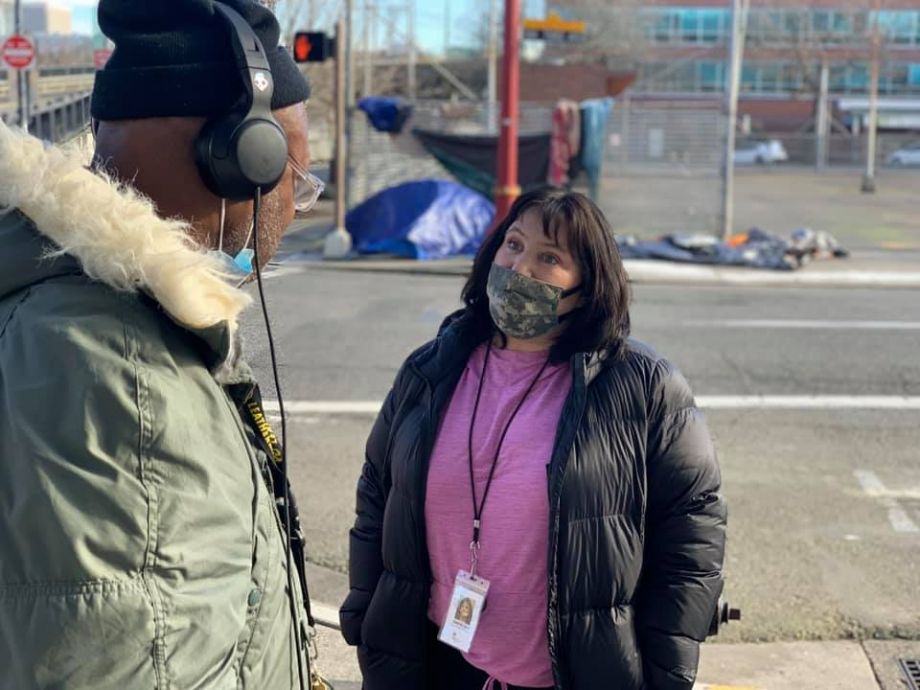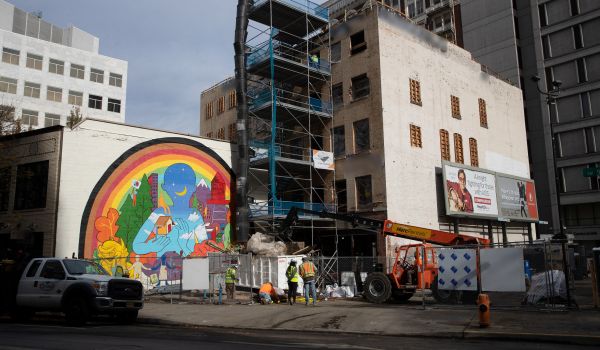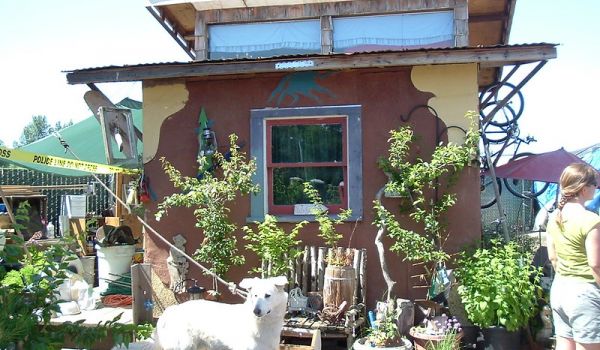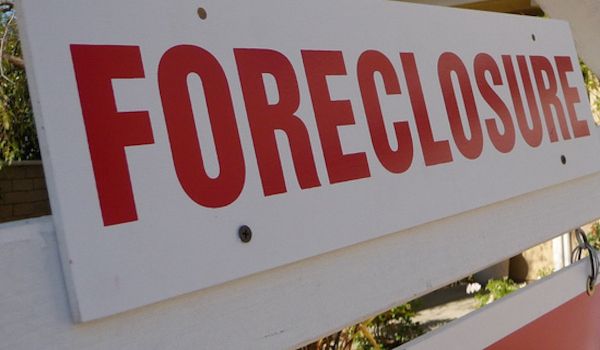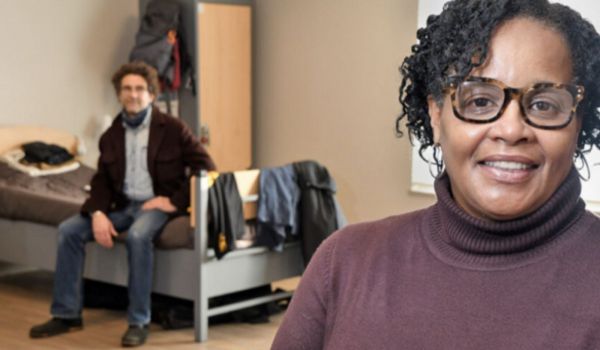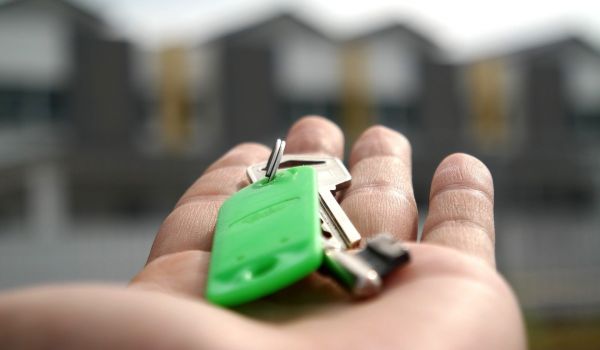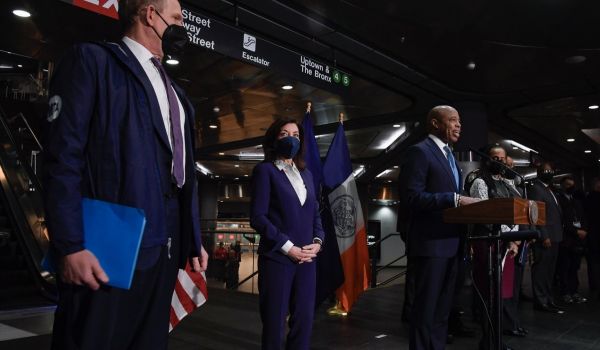Some unhoused Portlanders dealing with substance use or mental health challenges may soon have a new form of support: a local resident who has experienced at least some of what they’re going through.
A coalition of social service organizations in Portland, Oregon, is preparing to expand an innovative program that supports unhoused locals living with substance use disorders or behavioral health challenges. Called Old Town In-Reach, a pilot version of the peer support program was funded by Multnomah County last year. The county commission is now considering a request to expand the program for the coming year at a cost of $1.1 million. If expanded, the program will employ six to eight peer support specialists who rotate between local shelters and community centers providing counseling services.
“As far as I know, it’s the first of its kind where we’re collaborating around sharing personnel,” says Scott Kerman, executive director of Blanchet House, a nonprofit social services organization that offers clothing, meal and residential programs. The new peer support specialists would work with guests at Blanchet House, Rose Haven, William Temple House and Maybelle Center.
Kerman first approached Multnomah County to garner support for the program, which he calls “a model for the future.” Christa Jones, senior manager of the Community Mental Health Program in the Behavioral Health Division at Multnomah County and the point person on the county side of the program, says her team is also optimistic about the partnership.
While peer support programs can take many forms, at their core they are about a person with unique lived experience providing support to others with a focus on advocacy and mentorship. Jennifer Coon, a Portland-based peer support specialist, became a certified recovery mentor through a program with Transition Projects Inc. early into her own recovery from a substance use disorder and after transitioning from homelessness. She later received a second certification from Portland Community College.
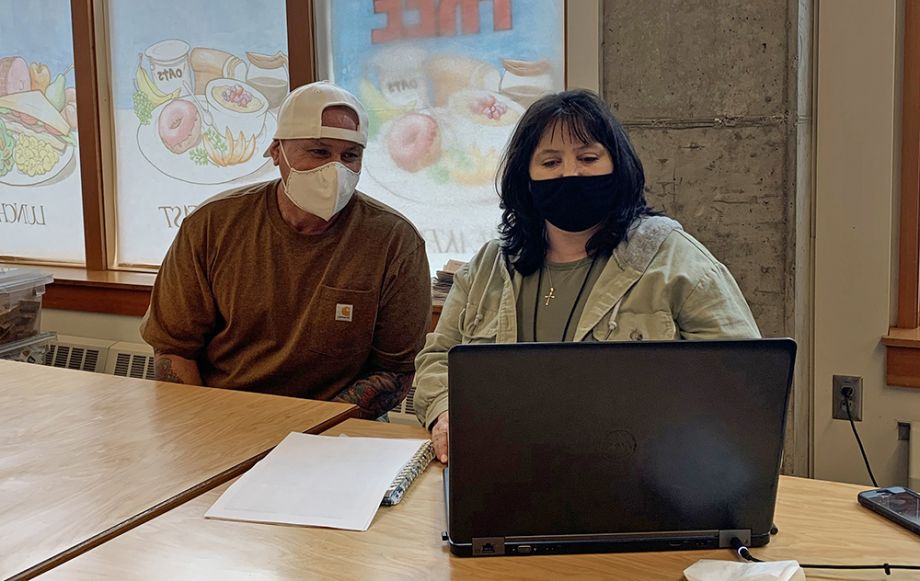
Jennifer Coon, left, helps Portlanders register for the COVID-19 vaccine. (Photo courtesy of Julie Showers/Blanchet House)
Coon is now one of two peer support specialists who have been working at Blanchet House for the last 18 months. The pair were initially hired through a partnership with the Mental Health and Addiction Association of Oregon. Kerman says that two things became apparent over time: The peer support specialists were experts at building trust and defusing crises that might otherwise disrupt services at Blanchet House.
“That trusting relationship is so important,” he says. “We’re serving people who are used to being disappointed, ignored or maybe even lied to, and so they’re reticent to ask for help because it doesn’t always result in anything good. As they come to trust their peers, they become more confident about asking for help, and that’s when we can really see some progress with maybe helping people get to a better place.”
Coon says she invests significant time, care and effort into developing relationships with the folks who come to Blanchet House looking for support. “Sometimes people just want to be heard,” she says. “Sometimes I don’t say a word, and I just listen, and that can be mutually rewarding.” Once she has gotten to know someone, Coon provides support in myriad ways — from connecting people to housing programs to accompanying them to COVID-19 vaccine appointments. “But it all starts with trust,” she says.
Elizabeth Starke, development director at Rose Haven, says partnering with Blanchet House on the Old Town In-Reach program was a no-brainer. “It fits into our model pretty well, because we’re a low-barrier agency and we do everything with a trauma-informed lens,” she says. “And that’s the model of peer support — it’s about not having an agenda for people, meeting them where they’re at, and letting them take steps towards their own recovery.” Rose Haven is unique in the Portland area as the only day shelter and community center that exclusively serves women, children and people marginalized by their gender.
Because peer support programs can take so many forms, it can be difficult to draw general conclusions about their effectiveness. But Helen Jack, a primary care physician and instructor at the University of Washington, has observed the success of various peer interventions in her work. Based on qualitative research in substance use disorder and behavioral health treatment settings, Jack says that peer support makes individuals feel more comfortable seeking medical care, reduces feelings of stigma and alienation, and reduces barriers to navigating social services, like applying for housing or unemployment.
When the Substance Abuse and Mental Health Services Administration, a branch of the Department of Health and Human Services, completed a pair of systematic reviews of available research into peer interventions in 2017, it also concluded that they have substantial positive impacts on participants. Some of the most significant positive effects observed in these studies included decreased criminal justice involvement, decreased emergency service utilization, and increased treatment retention among those who had access to peer support.
According to Jack, peer interventions work best when support specialists are employed in a “long-term position with a career trajectory” — the type of stability provided through the Old Town In-Reach program. “A longer-term role may allow the peer to really get to know a community, set of patients, and an organization and be more effective,” Jack says.
Getting to know the community and building interpersonal relationships are at the heart of the proposed expansion for Old Town In-Reach. Support specialists will rotate between four locations in Portland, allowing them to provide support to unhoused or other in-need community members wherever they seek services.
Kerman says the idea that specialists should rotate between service locations came out of conversations with executive directors at other Portland organizations and his previous work in school leadership. While working in schools, he observed that students had better outcomes when faculty and staff collaborated across departments to support them rather than taking a siloed approach.
“I think it’s just common sense that if the math teachers, the English teachers and the PE teachers talk to one another about the same students, they develop a fuller picture of that individual,” Kerman says. He suspects the same will hold when it comes to peer support across social services organizations in Portland.
Project partners and representatives at Multnomah County are overwhelmingly optimistic about Old Town In-Reach’s potential. Jones says it fits into a larger county-wide plan to better serve unhoused community members and folks living with substance use disorders or behavioral health challenges. Much of this work focuses on low-barrier programs and respect for lived experience. “Intentionality has been a value going into every single project that we are building because we want to have positive outcomes,” Jones says.
Denis Theriault, communications coordinator for the Multnomah County Joint Office of Homeless Services, says he has seen peer interventions work in other settings, such as with the Cascadia Street Outreach Team. “Making sure folks have lived experience, bring a peer lens to that work, doing community engagement — it makes a big difference,” Theriault says.
Starke agrees and says she can’t wait to see new peer support specialists at work at Rose Haven when the program expands.
“We know that just having people take the time to do some compassionate listening is really going to change all of our programs,” she says, “and make them more accessible and more efficient.”
This article is part of Backyard, a newsletter exploring scalable solutions to make housing fairer, more affordable and more environmentally sustainable. Subscribe to our weekly Backyard newsletter.




